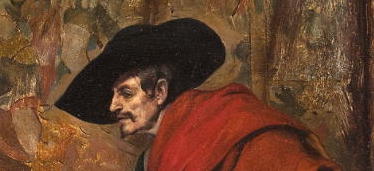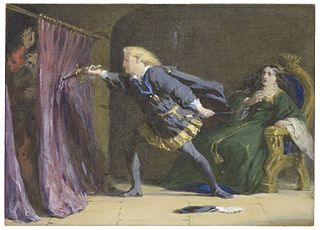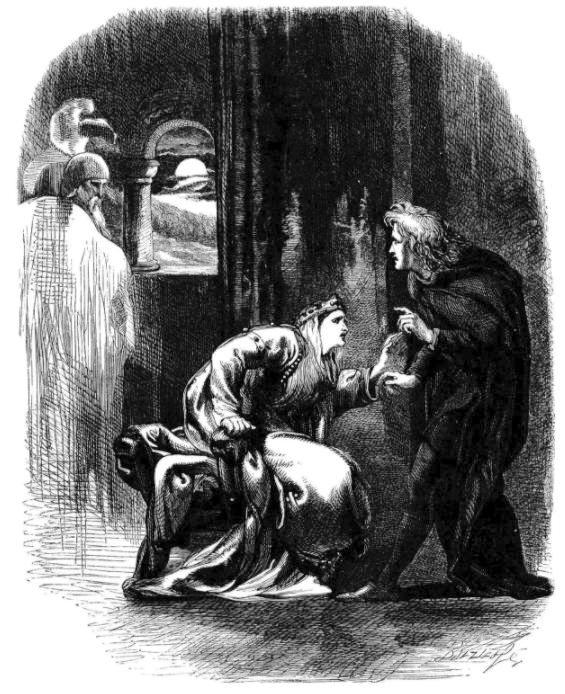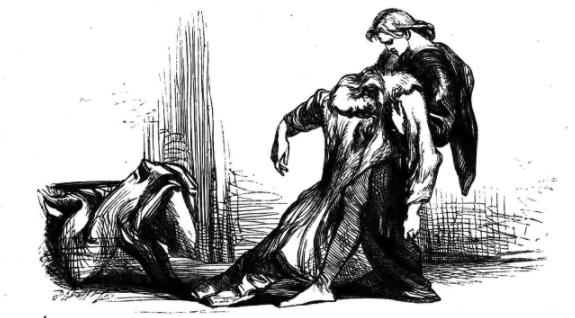Hamlet: Act 3, Scene 4
Enter [QUEEN] GERTRUDE
and POLONIUS.
POLONIUS
1 'A will come straight. Look you lay home to him:
1. straight: immediately Look you lay home to him: i.e., be sure to tell him the hard truth.
2 Tell him his pranks have been too broad to bear with,
2. broad: offensive, crude.
3 And that your grace hath screen'd and stood between
4 Much heat and him. I'll sconce me even here.
4. Much heat: i.e., the King's anger. sconce: ensconce, hide.
5 Pray you, be round with him.
5. round: plain-spoken, blunt.
HAMLET (Within.)
Mother, mother, mother!
QUEEN
6 I'll warrant you, fear me not:
6. fear me not: i.e., have no fears about my handling of the situation.
7 Withdraw, I hear him coming.
[Polonius hides behind the arras.]
Enter Hamlet.
HAMLET
8 Now, mother, what's the matter?
QUEEN
9 Hamlet, thou hast thy father much offended.
9. thy father: i.e., your step-father, the current king.
HAMLET
10 Mother, you have my father much offended.
10. my father: i.e., your late husband, King Hamlet.
QUEEN
11 Come, come, you answer with an idle tongue.
11. idle: foolish.
HAMLET
12 Go, go, you question with a wicked tongue.
QUEEN
13 Why, how now, Hamlet!
HAMLET
What's the matter now?
QUEEN
14 Have you forgot me?
14. Have you forgot me?: i.e., have you forgotten who I am? — The Queen is indignant at Hamlet's lack of respect for her.
HAMLET
No, by the rood, not so:
14. rood: cross.
15 You are the queen, your husband's brother's wife;
16 And—would it were not so!—you are my mother.
QUEEN
17 Nay, then, I'll set those to you that can speak.
17. I'll set those to you that can speak: i.e., I'll bring some who will speak and make you listen. — It's hard to imagine just who the Queen has in mind, but the next line appears to indicate that she walks toward the door, as if to go and get those people who will "speak."
HAMLET
18 Come, come, and sit you down; you shall not budge;
19 You go not till I set you up a glass
20 Where you may see the inmost part of you.
QUEEN
21 What wilt thou do? thou wilt not murder me?
22 Help, ho!
POLONIUS [Behind.]
23 What, ho! Help!
HAMLET [Drawing his sword.]
24 How now! a rat? Dead, for a ducat, dead!
24. for a ducat: I'll wager a ducat.
[Stabs through the arras.]
POLONIUS [Behind.]
25 O, I am slain!
[Falls and dies.]
QUEEN
25 O me, what hast thou done?
HAMLET
26 Nay, I know not: Is it the king?
QUEEN
27 O, what a rash and bloody deed is this!
HAMLET
28 A bloody deed! almost as bad, good mother,
29 As kill a king, and marry with his brother.
QUEEN
30 As kill a king!
HAMLET
30 Ay, lady, 'twas my word.
[Lifts up the arras and sees Polonius.]
31 Thou wretched, rash, intruding fool, farewell!
32 I took thee for thy better: take thy fortune;
32. I took thee for thy better: i.e., I mistook you for the king.
33 Thou find'st to be too busy is some danger.
33. busy: officious, meddlesome, nosy. is some danger: is a bit dangerous. — Hamlet is being sarcastic.
[To the Queen.]
34 Leave wringing of your hands: peace! sit you down,
34. peace!: shut up!
35 And let me wring your heart; for so I shall,
36 If it be made of penetrable stuff,
37 If damned custom have not braz'd it so
37. damned custom: i.e., the habit of ill-doing, habitual wickedness. braz'd: brazened, hardened.
38 That it is proof and bulwark against sense.
38. proof and bulwark: armor and fortification. sense: sensibility, feeling.
QUEEN
39 What have I done, that thou darest wag thy tongue
40 In noise so rude against me?
HAMLET
Such an act
41 That blurs the grace and blush of modesty,
42 Calls virtue hypocrite, takes off the rose
42. rose: i.e., bloom.
43 From the fair forehead of an innocent love
44 And sets a blister there, makes marriage-vows
45 As false as dicers' oaths: O, such a deed
46 As from the body of contraction plucks
46. contraction: the marriage contract.
47 The very soul, and sweet religion makes
47. religion: i.e., sacred vows.
48 A rhapsody of words. Heaven's face doth glow
48. rhapsody: senseless collection, jumble.
49 O'er this solidity and compound mass,
50 With tristful visage, as against the doom,
51 Is thought-sick at the act.
48-51. Heaven's . . act: heaven's face flushes with anger to look down upon this solid world and everything of which it is composed, with sorrowful visage as though the day of doom were near, [and] is thought-sick at what you have done.
QUEEN
Ay me, what act,
52 That roars so loud, and thunders in the index?
52. index: i.e., table of contents at the beginning of a book.
HAMLET
53 Look here, upon this picture, and on this,
54 The counterfeit presentment of two brothers.
54. counterfeit presentment: painted likenesses.
55 See, what a grace was seated on this brow;
56 Hyperion's curls; the front of Jove himself;
56. Hyperion's: the sun-god's. front: forehead.
57 An eye like Mars, to threaten and command;
58 A station like the herald Mercury
58. station: bearing or manner of standing.
59 New-lighted on a heaven-kissing hill;

60 A combination and a form indeed,
61 Where every god did seem to set his seal,
62 To give the world assurance of a man:
63 This was your husband. Look you now, what follows:
64 Here is your husband; like a mildew'd ear,
64. ear: ear of grain.
65 Blasting his wholesome brother. Have you eyes?
65. blasting: infecting, sickening.
66 Could you on this fair mountain leave to feed,
67 And batten on this moor? Ha! have you eyes?
67. batten: gorge. moor: barren upland.
68 You cannot call it love; for at your age
69 The heyday in the blood is tame, it's humble,
69. heyday: excitement.
70 And waits upon the judgment: and what judgment
71 Would step from this to this? Sense, sure, you have,
71. Sense: sense perception.
72 Else could you not have motion; but sure, that sense
72. Else could you not have motion: Otherwise, you could not function as a living creature.
73 Is apoplex'd; for madness would not err,
73. apoplex'd: paralyzed.
74 Nor sense to ecstasy was ne'er so thrall'd
75 But it reserved some quantity of choice,
76 To serve in such a difference. What devil was't
73-76. madness . . . difference: i.e., even madness itself could see the difference between the two.
77 That thus hath cozen'd you at hoodman-blind?
77. cozen'd: cheated. hoodman-blind: blindman's bluff.
78 Eyes without feeling, feeling without sight,
79 Ears without hands or eyes, smelling sans all,
79. sans: without.
80 Or but a sickly part of one true sense
81 Could not so mope.
81. mope: be dazed, act aimlessly.
82 O shame! where is thy blush? Rebellious hell,
83 If thou canst mutine in a matron's bones,
83. mutine: mutiny, rebel.
84 To flaming youth let virtue be as wax,
85 And melt in her own fire: proclaim no shame
85-88. proclaim . . . will: i.e., do not call it shameful when the irresistible desires (of the young) send them charging into lustful action, since frost itself (you, mother) burns just as actively, and reason acts as a pimp for the will.
86 When the compulsive ardor gives the charge,
87 Since frost itself as actively doth burn
88 And reason panders will.
QUEEN
O Hamlet, speak no more:
89 Thou turn'st mine eyes into my very soul;
90 And there I see such black and grained spots
90. grained: dyed in grain, indelible.
91 As will not leave their tinct.
91. leave their tinct: give up their stain [of shame].
HAMLET
Nay, but to live
92 In the rank sweat of an enseamed bed,
92. enseamed: greasy.
93 Stew'd in corruption, honeying and making love
94 Over the nasty sty—
QUEEN
O, speak to me no more;
95 These words, like daggers, enter in mine ears;
96 No more, sweet Hamlet!
HAMLET
A murderer and a villain;
97 A slave that is not twentieth part the tithe
97. tithe: tenth part.
98 Of your precedent lord, a vice of kings,
98. precedent: former (i.e., the elder Hamlet.) vice: buffoon. In the medieval morality plays the Vice was a popular character who ran about shooting off firecrackers and making mischief.
99 A cutpurse of the empire and the rule,
100 That from a shelf the precious diadem stole,
101 And put it in his pocket!
QUEEN
No more!
HAMLET
102. of shreds and patches: clownish, patched-up.
102 A king of shreds and patches—
Enter GHOST.
103 Save me, and hover o'er me with your wings,
104 You heavenly guards! What would your gracious figure?
QUEEN
105 Alas, he's mad!
HAMLET
106 Do you not come your tardy son to chide,
107 That, lapsed in time and passion, lets go by
108 The important acting of your dread command?
108. important: urgent.
109 O, say!
Ghost
110 Do not forget: this visitation
111 Is but to whet thy almost blunted purpose.
112 But, look, amazement on thy mother sits:
112. amazement: utter bewilderment or distraction.
113 O, step between her and her fighting soul:
114 Conceit in weakest bodies strongest works:
114. conceit: i.e., conjecture, mental image.
115 Speak to her, Hamlet.
HAMLET
How is it with you, lady?
QUEEN
116 Alas, how is't with you,
117 That you do bend your eye on vacancy
118 And with the incorporal air do hold discourse?
118. incorporal: immaterial, insubstantial.
119 Forth at your eyes your spirits wildly peep;
120 And, as the sleeping soldiers in the alarm,
120. in th' alarm: when the call to arms is sounded.
121 Your bedded hair, like life in excrements,
121. bedded: laid in smooth layers. excrements: outgrowths [such as hair or fingernails].
122 Starts up, and stands on end. O gentle son,
122. Starts up: suddenly rises up.
123 Upon the heat and flame of thy distemper
124 Sprinkle cool patience. Whereon do you look?
124. patience: self-control.
HAMLET
125 On him, on him! Look you, how pale he glares!
125. glares: shines.
126 His form and cause conjoin'd, preaching to stones,
126. His form and cause: i.e., his ghostly appearance and the wrong done to him.
127 Would make them capable.
127. would make them capable: i.e., would make the stones sympathize with the Ghost.
[To the Ghost.]
— Do not look upon me;
128 Lest with this piteous action you convert
129 My stern effects: then what I have to do
128-129. Lest . . . effects: i.e., Lest your look fill me with pity and make me change my stern purpose.
130 Will want true color; tears perchance for blood.
129-130. then what . . . blood: i.e., then what I am going to do will lack its proper appearance; I may shed tears rather than the blood of King Claudius.
QUEEN
131 To whom do you speak this?
HAMLET
Do you see nothing there?
QUEEN
132 Nothing at all; yet all that is I see.
HAMLET
133 Nor did you nothing hear?
QUEEN
No, nothing but ourselves.
HAMLET
134 Why, look you there! look, how it steals away!
135 My father, in his habit as he lived!
135. habit: usual clothes.
136 Look, where he goes, even now, out at the portal!
Exit Ghost.
QUEEN
137 This the very coinage of your brain:
138 This bodiless creation ecstasy
138-139. This bodiless creation ecstasy / Is very cunning in: i.e., madness is very good at creating such illusions.
139 Is very cunning in.
HAMLET
Ecstasy!
140 My pulse, as yours, doth temperately keep time,
141 And makes as healthful music: it is not madness
142 That I have utter'd: bring me to the test,
143 And I the matter will re-word; which madness
144 Would gambol from. Mother, for love of grace,
144. gambol from: dance away from.
145 Lay not that flattering unction to your soul,
145. flattering unction: soothing ointment.
146 That not your trespass, but my madness speaks:
147 It will but skin and film the ulcerous place,
147. ulcerous place: i.e., skin ulcer.
148 Whilst rank corruption, mining all within,
148. mining: working under the surface.
149 Infects unseen. Confess yourself to heaven;
150 Repent what's past; avoid what is to come;
151 And do not spread the compost on the weeds,
151. compost: manure.
152 To make them ranker. Forgive me this my virtue;
152. Forgive me this my virtue: i.e., forgive me for having enough virtue to tell you honestly what's wrong with you.
153 For in the fatness of these pursy times
153. fatness: grossness. pursy: puffy, out of condition or short-winded and corpulent.
154 Virtue itself of vice must pardon beg,
155 Yea, curb and woo for leave to do him good.
155. curb and woo: bow and entreat. leave: permission.
— Hamlet is being very sarcastic.
— Hamlet is being very sarcastic.
QUEEN
156 O Hamlet, thou hast cleft my heart in twain.
HAMLET
157 O, throw away the worser part of it,
158 And live the purer with the other half.
159 Good night: but go not to mine uncle's bed;
160 Assume a virtue, if you have it not.
161 That monster, custom, who all sense doth eat,
161. all sense doth eat: wears away all natural feeling.
162 Of habits devil, is angel yet in this,
162. Of habits devil: i.e., though it acts like a devil in establishing bad habits.
163 That to the use of actions fair and good
164 He likewise gives a frock or livery,
164. frock or livery: i.e., a kind of uniform. — One meaning of "frock" was a monk's habit. A "livery" is a uniform worn by servants of a household. Both a frock and a livery indicate a loyalty to certain group and its standards.
165 That aptly is put on. Refrain tonight,
166 And that shall lend a kind of easiness
167 To the next abstinence: the next more easy;
168 For use almost can change the stamp of nature,
168. use: behavioral habit.
169 And either master the devil, or throw him out
170 With wondrous potency. Once more, good night:
171 And when you are desirous to be bless'd,
171-172. when you are desirous to be bless'd, / I'll blessing beg of you: i.e., when you want me to bless you (for having followed my advice and refused sex with King Claudius), I'll beg your blessing (and forgiveness, for being so harsh).
172 I'll blessing beg of you. For this same lord,
[Pointing to Polonius.]
173 I do repent: but heaven hath pleased it so,
174 To punish me with this and this with me,
175 That I must be their scourge and minister.
175. scourge and minister: i.e., the agent of heavenly punishment.
176 I will bestow him, and will answer well
176. bestow: dispose of. answer: answer for, suffer the consequences of.
177 The death I gave him. So, again, good night.
178 I must be cruel, only to be kind:
179 Thus bad begins and worse remains behind.
179. remains behind: i.e., is yet to come.
180 One word more, good lady.
QUEEN
What shall I do?
HAMLET
181 Not this, by no means, that I bid you do:
182 Let the bloat king tempt you again to bed;
182. bloat: bloated.
183 Pinch wanton on your cheek; call you his mouse;
184 And let him, for a pair of reechy kisses,
184. reechy: filthy, smelly.
185 Or paddling in your neck with his damn'd fingers,
186 Make you to ravel all this matter out,
187 That I essentially am not in madness,
188 But mad in craft. 'Twere good you let him know;
188. good: — Hamlet is being sarcastic.
189 For who, that's but a queen, fair, sober, wise,
190 Would from a paddock, from a bat, a gib,
190. paddock: toad. gib: tom-cat.
191 Such dear concernings hide? who would do so?
191. dear concernings: matters of intense concern and importance.
192 No, in despite of sense and secrecy,
193 Unpeg the basket on the house's top.
193. Unpeg the basket: open the door of the cage; i.e., let out the secret.
194 Let the birds fly, and, like the famous ape,
194. famous ape: — The actual story has been lost.
195 To try conclusions, in the basket creep,
195. conclusions: experiments.
196 And break your own neck down.
196. down: by falling down from the roof.
QUEEN
197 Be thou assured, if words be made of breath,
198 And breath of life, I have no life to breathe
199 What thou hast said to me.
HAMLET
200 I must to England; you know that?
QUEEN
Alack,
201 I had forgot: 'tis so concluded on.
HAMLET
202 There's letters seal'd: and my two schoolfellows,
203 Whom I will trust as I will adders fang'd,
204 They bear the mandate; they must sweep my way,
204. mandate: the message from the King to the English. sweep my way: prepare my way.
205 And marshal me to knavery. Let it work;
205. marshal . . . knavery: conduct me to a trap.
206 For 'tis the sport to have the engineer
206. enginer: deviser of military "engines" or contrivances.
207 Hoist with his own petard: and 't shall go hard
207. Hoist with: blown up by. petard: bomb..
208 But I will delve one yard below their mines,
208. mines: tunnels used in warfare to undermine the enemy's walls; Hamlet will countermine by going under their mines.
209 And blow them at the moon: O, 'tis most sweet,
210 When in one line two crafts directly meet.
210. crafts: plots.
211 This man shall set me packing:
211. packing: (1) taking on a load; (2) leaving in a hurry.
212 I'll lug the guts into the neighbour room.
213 Mother, good night. Indeed this counsellor
214 Is now most still, most secret and most grave,
215 Who was in life a foolish prating knave.
216 Come, sir, to draw toward an end with you.
216. draw toward an end with you: (1) bring my conversation with you to a close; (2) drag you to your resting-place.
217 Good night, mother.
Exeunt [The queen leaves by one door;
Hamlet drags Polonius' body out the other door].



